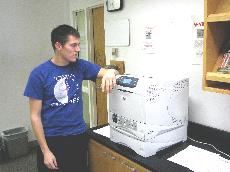From red and gold to green:

December 7, 2007
Paper or no paper? That’s the question being posed by a group of biology students this fall.
The students, juniors Sarah Engel, Laura Anderson and Maggie Anderson, are all enrolled in BIO 103: Environmental Issues, taught by Ryan Rehmeier, assistant professor of biology.
Engel said the group’s study was drawn from material studied in class.
“Our lectures in class have helped point out environmental issues, such as global warming, the effects of fossil fuels, greenhouse gasses and many more issues,” Engel said.
Rehmeier said students in the class were asked to submit a one-page proposal for a study to him early in the semester. The studies will serve as a final project for one part of the course.
“The projects have been in the works for a while now,” Rehmeier said. “The projects will make up a big part of the grades for the lab portion of the course.”
Anderson said with their growing knowledge of many different environmental issues, students were told to choose a topic that would possibly help Simpson become more environmentally friendly.
“We know that paper usage is a growing concern on our campus, due to the implementation of the new PaperCut program this fall,” Anderson said. “Therefore, we decided to investigate the idea of an online campus. We are hoping to find an alternative to using so much paper, and the online campus was one idea we came up with.”
Anderson said the group’s definition of an online campus would be one where instructors would provide all class handouts, syllabi, study notes and assignments online. Students would also submit assignments and complete tests online.
According to the group, this would require all students have access to a PDA for classes as well as a computer outside class to complete their work. The online campus would reduce the amount of paper used on campus for class work.
After researching with other schools and on campus, the group decided to conduct a survey of faculty and students to learn more about the feelings toward an online campus.
Engel said the group created two separate surveys, one for faculty and one for students. The student survey had 10 questions, while the faculty survey had only eight questions. The type of questions in the survey concerned the use of paper after printing, academic honesty and tests, quizzes and assignments, the success of students using an online campus, and the feelings and opinions both groups had about having an online campus.
Rehmeier said the numbers on paper usage are staggering and there are both positives and negatives in converting a campus to be paper-free.
“Just getting rid of paper doesn’t necessarily make a huge impact, because the computers and technology needed to replace the paper are very energy-rich,” Rehmeier said. “Paper also takes a lot of energy and resources to create.”
Rehmeier also said there would be concerns about cost and even academic dishonesty. He said there would be savings in the long term, but no one wants to cover the big expenses now for student access to PDA’s or laptop computers.
“As a faculty member, while I trust my students, I can see the potential for increased academic dishonesty,” Rehmeier said.
Engel said once the results of the survey are collected, they will compare the Simpson community’s opinions with the environmental facts they’ve gathered about paper and online campuses.
Rehmeier said his hope with the projects is that they can be developed to the extent that they can be given to the administration.
“I didn’t want to have students write papers that just disappear into file cabinets,” Rehmeier said. “Ideally, a few of the projects would end up on the president’s desk to see what can be changed on campus.”











